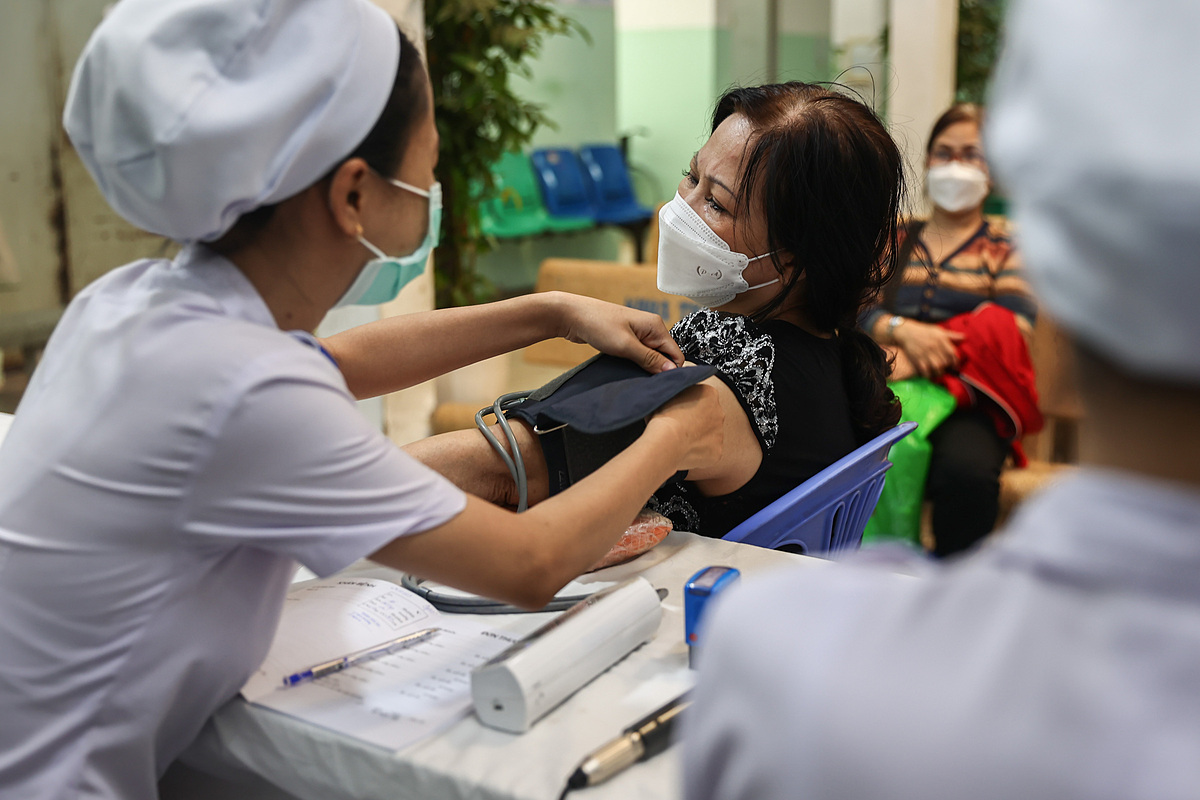"High blood pressure is a condition that patients often neglect because it usually has no symptoms, and taking medication doesn't seem to make any difference," Dr. Giang Minh Nhat, head of the Cardiovascular Resuscitation Department at Gia Dinh People's Hospital, said at the hospital's annual scientific conference on 2/8.
According to Dr. Nhat, prolonged and uncontrolled high blood pressure can silently cause serious damage to many organs in the body. In the brain, it is the leading risk factor for ischemic and hemorrhagic stroke. For the heart, patients have a high risk of heart attack and heart failure. High blood pressure is also a common cause of chronic kidney disease, which can lead to end-stage renal failure. Damage to blood vessels due to high blood pressure can also cause blindness and many other severe complications.
The World Health Organization (WHO) estimates that one in 3 adults in Vietnam has high blood pressure. Alarmingly, only about 50% of these individuals are diagnosed. Of those diagnosed, the treatment rate is even lower – only about 30%. As a result, high blood pressure is the leading cause of death from cardiovascular disease in Vietnam.
 |
Dr. Giang Minh Nhat, head of the Cardiovascular Resuscitation Department at Gia Dinh People's Hospital, at the hospital's annual scientific conference on 2/8. Photo: Minh Toan |
Dr. Giang Minh Nhat, head of the Cardiovascular Resuscitation Department at Gia Dinh People's Hospital, at the hospital's annual scientific conference on 2/8. Photo: Minh Toan
High blood pressure is easily detected; a simple blood pressure measurement can lead to a diagnosis. However, it is important to measure it correctly and to evaluate the circumstances properly. Someone with a systolic blood pressure fluctuating between 150 and 160 mmHg in a few isolated measurements – for instance, after stress, lack of sleep, or physical activity – is not considered to have high blood pressure.
Only when high blood pressure is repeatedly measured in different instances, with systolic readings of 135 mmHg or higher and diastolic readings of 85 mmHg or higher, is the person suspected of having the condition. At that point, they should go to a medical facility for a comprehensive examination to evaluate their blood pressure, determine if there is any organ damage, and screen for related underlying conditions to determine appropriate treatment. They should absolutely not self-medicate by purchasing medication from a pharmacy upon noticing high blood pressure.
Dr. Nhat noted a common occurrence: many people stop taking their medication after a period of treatment when their blood pressure stabilizes. They are unaware of the danger of doing this. In reality, blood pressure is only stable with consistent treatment. If medication is stopped, blood pressure almost certainly rises again, silently causing serious complications.
"High blood pressure is a chronic disease and a lifelong cardiovascular risk factor that requires continuous monitoring and control. It should not be taken lightly," he said.
 |
Measuring a patient's blood pressure at the hospital. Photo: Quynh Tran |
Measuring a patient's blood pressure at the hospital. Photo: Quynh Tran
High blood pressure has complex pathogenesis related to both genetic factors and the living environment. If someone in the family has the condition, other family members are also at higher risk. In addition, an unhealthy lifestyle, such as a high-salt diet, consumption of processed foods, and lack of physical activity, contributes to the increased risk.
High blood pressure is trending toward younger demographics. There are cases of people in their 20s and 30s with the condition. Many only discover they have high blood pressure, high cholesterol, or diabetes after experiencing severe complications like stroke, heart attack, or kidney failure, due to a lack of regular health checkups.
To prevent high blood pressure, individuals should adopt a healthy lifestyle, maintain a balanced diet, reduce salt intake, limit sugar and refined starches, and increase their consumption of vegetables and fresh fruit. They should also exercise regularly at least 3 times a week for a minimum of 30 minutes per session. Crucially, they should have regular health checkups, even without symptoms, for early detection and timely treatment to minimize the risk of dangerous complications later on.
Le Phuong












